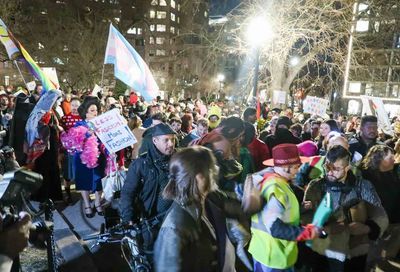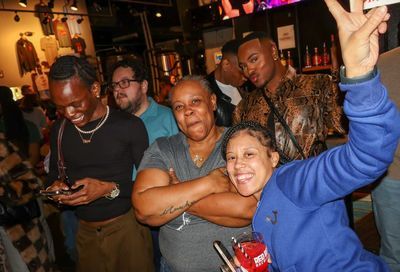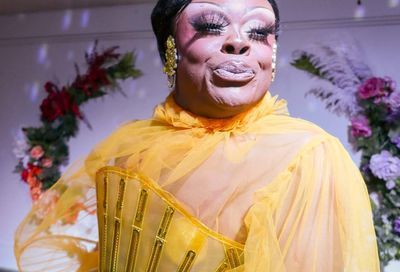Mondaire Jones: ‘I’ve experienced more racism than homophobia on the campaign trail’
Mondaire Jones, an openly gay New Yorker likely to win a seat in Congress, is one of the Democratic Party's newest rising stars

“My mentality has always been not to wait for other people to do anything that I can do myself,” says Mondaire Jones, the Democratic nominee for New York’s 17th Congressional District. Covering the suburbs to the north of New York City, the district’s Democratic lean means that Jones will likely succeed in the upcoming election, putting him on the cusp of becoming one of the first two openly gay Black members of Congress, along with New York’s Ritchie Torres, who recently won his own primary in the Bronx-based 15th Congressional District.
Despite the history-making nature of his candidacy, it was not his background or identity that made Jones stand out in a crowded Democratic primary field, but his ideology. Jones had previously announced his intention to challenge long-term Congresswoman and House Appropriations Chairwoman Nita Lowey, who has served in Congress since 1988, citing his dissatisfaction with her positions on climate change, student debt, and oversight of the Trump administration, among several other issues.
Following Lowey’s retirement, the primary field soon became crowded, attracting a national security expert, a state representative, an abortion-rights advocate, an assistant U.S. attorney from a prominent, wealthy family, and a conservative state senator who had rankled liberals by siding with Republicans in order to thwart progressive legislation.
Throughout it all, Jones was able to distinguish himself from his opponents by trumpeting support for progressive policy priorities, including Medicare for All, the Green New Deal, abolishing private prisons, and legalizing marijuana. Those strong stances earned him love from progressive organizations and endorsements from Washington figures who hold significant sway within left-wing circles, including Sens. Elizabeth Warren (D-Mass.) and Bernie Sanders (I-Vt.) and Congresswomen Ayanna Pressley (D-Mass.), Alexandria Ocasio-Cortez (D-N.Y.), Katie Porter (D-Calif.), and Barbara Lee (D-Calif.).
On the day of the primary election, Jones took a two-to-one lead over his nearest opponent, which eventually changed into a three-to-one lead as mail-in ballots were tabulated over the course of several weeks.
“I had an economic message and a message of racial justice that resonated with people in the district in a way that the messages of my opponents did not come close to,” Jones says. “One of my opponents was talking about Russia, another one of my opponents was talking about prosecuting Donald Trump, which strangely presumes that Donald Trump gets reelected in the fall and will be around by the time that he would serve in Congress. And nearly everyone else was just talking about what we couldn’t do, saying that my goals were too ambitious. People don’t want to be told what they can’t do. That is not inspirational leadership, and people want to be inspired, especially by their member of Congress.”
Jones’ victory marks yet another win for an emboldened progressive movement over establishment Democrats who have generally embraced a Bill Clinton-era approach to politics, preaching caution and circumspection over bolder, unapologetic actions and sweeping reforms. As a member of a progressive caucus that is likely to grow, particularly if Democrats pick up seats in competitive districts, Jones could be poised to influence policy by pushing his fellow lawmakers to adopt bolder, more economically-populist stances when it comes to policy, particularly on domestic issues — much like the Tea Party movement pushed Republicans rightward and made them more deferential to populist tendencies during Barack Obama’s presidency.
As a millennial lawmaker with an active Twitter account who enjoys strong support from grassroots activists, Jones will also be afforded a platform that allows him to lay out a comprehensive, and more progressive vision for America’s future, reaching large numbers of people without having to go through traditional media outlets or be worried about having his statements filtered or misrepresented.
Jones’ personal story is very much an American one, rising from relative poverty to a Department of Justice civilian employee to a lawyer over the course of his 33 years, and now just months from being elected to Congress. The only son of a single mother living in Spring Valley, N.Y., and partially raised by his grandparents, Jones’ rise to power is a testament to his perseverance and his lifelong desire — starting with a stint on the NAACP Youth Council as a teenager — to push for reform and radical changes aimed at bettering the lives of working families like his own.
Speaking to activist DeRay Mckesson on the podcast Pod Save the People last year, Jones reflected on the historical significance of his candidacy, telling Mckesson, “When I was growing up poor, black and gay, it would have made my life so much easier to be able to look to an openly gay Black member of Congress…because that would have been direct evidence for me that things really do get better.
“So while I’m not running to be the first openly gay Black member of Congress, I am definitely acutely aware of the fact that I’m already making a difference in the lives of young people who are paying attention to this campaign, and folks you might not even imagine, who are older than I am, saying, ‘You know what? I’m really proud of you. You’re giving our community great confidence to be our authentic selves,’ and that representation cannot be underestimated.”

METRO WEEKLY: Let’s talk about your childhood. Where did you grow up?
MONDAIRE JONES: I grew up in the village of Spring Valley. It is a working-class community of about 30,000 people in Rockland County, which is a suburb of New York City. I grew up in Section 8 housing and on food stamps, and my young, single mother still had to work multiple jobs to put food on the table for us. She got help raising me from my grandparents. My grandfather was a janitor and my grandmother cleaned homes, and when daycare was too expensive she took me to work with her. So now I get to run to represent the same people whose homes I watched my grandmother clean, growing up.
MW: What were you like as a child?
JONES: I was very active in school, and I was a really good student. I was involved in a lot of extracurricular activities. In fact, my foray into politics was as a freshman at Spring Valley High School, when I saw how difficult it was to pass a public school budget in the East Ramapo Central School District. And of course, a passing of the school budget is something that most politicians take for granted, but not so in my district. And so I reactivated the Spring Valley NAACP Youth Council, and we registered people to vote, and we got out the vote, and we passed those school budgets. Unfortunately, that same school district does not provide the same quality education that I received when I was growing up.
That experience in my freshman year of high school was instructive, because it was really a stark example of the failure of government, and of government officials, to do right by the people they were supposed to serve. It has been a school board that does not provide sufficient resources to the public school students it represents. And that is true of the school board today.
At the time that I got involved in the Spring Valley NAACP Youth Council, we still had a majority on a school board that cared about public education. And there were some members of the school board who did not, but there was always a need for government intervention that never happened at the state level.
MW: What happened after you graduated from high school?
JONES: I went to Stanford University, where I studied political science and minored in African and African-American studies, and got increasingly in progressive causes.
When I was 19 years old, I was elected chair of a committee on the National Board of Directors for the NAACP. I got involved in the student government, first as a member of Frosh Council, then as an Undergraduate Senator, where I chaired the Campus Advocacy Committee. And then it was as student body vice president, and throughout my time there, I was getting involved in campaigns, like increasing faculty and graduate student diversity on campus, and fighting for a living wage for dining hall and maintenance workers. Gender neutral housing was also another issue that I championed.
MW: Let’s talk about some of those campaigns and how they worked.
JONES: The big issues tend to be the ones that are intractable, and so it took many years to get the university to allocate more resources to recruiting and retaining diverse faculty and graduate students. That is still a challenge at Stanford University. The fight for a living wage was unsuccessful, unfortunately, when I was there. But some of the tactics that we used were getting the Undergraduate Senate and Graduate Student Council to pass resolutions. It was meeting with administrators, it was rallying students at both the undergraduate and graduate student levels to make these issues salient and to pressure the administrators to make concessions.
MW: You mentioned some of those campaigns weren’t successful. What lessons did you take away from the losses?
JONES: That change is not easy. That the kind of progress that we want to see in the world is often hard-fought and long-suffering work. And we’ll get there, we’ve gotten there in other areas of life. I didn’t think that, for most of my life, an openly gay, black candidate could be elected to Congress, and I’m changing that right now in real time. And I didn’t think that there would be an openly gay candidate for a Democratic nomination [for President] who would be a leading contender for a period of time. And Mayor Pete did that.
MW: What was your first job after graduating?
JONES: It was at the Department of Justice, in the Office of Legal Policy. Not to be confused with the Office of Legal Counsel. I had a postgraduate fellowship from Stanford University, it was a public service fellowship, that I used to spend a year at the Department of Justice. And within the Office of Legal Policy, I vetted candidates for federal justice, and I co-authored a report to Attorney General Holder on criminal justice reform.

MW: What did that work teach you?
JONES: Well, my greatest lesson was that Democrats have got to be fighting harder for the things we say we believe in, because when I was in the Office of Legal Policy, the media were writing articles on the historically slow pace at which we were confirming nominees to the federal judiciary. And that was because we did not make the kind of rules changes in the U.S. Senate, that subsequently were made, which accelerated that process. We were too indulgent in Republican obstruction.
We were too patient with Republicans who were not acting in good faith, and I can bring that sense with me to Congress, because I do not believe that Republicans in Congress operate in good faith. We have seen that under the presidency of Donald Trump, where they enable his worst impulses and never criticize him, nor seek to meaningfully hold him accountable.
MW: Some people would say that it started prior to that, looking at the way that Republicans sabotaged health care reform during the Obama administration.
JONES: Absolutely. And that process was concurrent with my time at the Department of Justice. Barack Obama would hold these roundtables where people like Paul Ryan would just talk so disrespectfully to him, and again, not in good faith. He was negotiating with people who did not want to see any health care reform in this country, besides the fact that leaders of the party, such as Ronald Reagan, had previously come out in support of health care reform in another era. It was an effort to prevent him from getting any wins because he was a Democrat. And that is somehow a more tame Republican Party than what we find today.
MW: Populism is ascendant, not just in the United States but globally. There are populist messages in the progressive platform that appeal to many people, but Donald Trump also offers a brand of populism, one that invokes strident nationalism, isolationism, and restrictive policies regarding racial justice or immigration. How do you differentiate them for voters?
JONES: Populism does not have to be infused with racism and misogyny and xenophobia, and Islamophobia in the way that Donald Trump’s brand of populism is. And, to be sure, Donald Trump is not, from my perspective, a populist. He is a plutocrat who masquerades as a populist. But any superficial assessment of his time in office, I think, really reveals him to be someone who is not meaningfully committed to the American people, and to working-class people.
MW: What is the current status of progressives in the Democratic party?
JONES: The progressive movement in American politics is ascendent. The progressives have never had more power, and in national and local politics. We see that in New York State, where the Democratic Socialists of America just had a clean sweep in their state legislative races, including against numerous incumbents backed by the political establishment, which was unthinkable even a few years ago because of what was perceived to be the power of the machines in New York City.
MW: When the Tea Party movement was growing in 2010, Republicans embraced it and attempted to co-opt the movement, successfully using its energy to propel the party to huge political gains. Why isn’t the Democratic Party doing the same thing with the progressive movement?
JONES: Because too many people in leadership within the Democratic party are still traumatized from losses in the 1980s, and have failed to fully appreciate and meet the moment. Americans want big structural changes for our most intractable problems. And, instead, despite the fact that a majority of the American people support Medicare for All, in the midst of a global pandemic, no less, that policy item was soundly defeated by the DNC’s Platform Committee.
The legalization of marijuana is largely popular with the American people. And so many states have gone ahead and done what the federal government should have done a long time ago, and legalized cannabis. Yet the Democratic Party’s Platform Committee rejected the legalization of marijuana as a policy item, soundly. And did so in the midst of mass incarceration of Black and Hispanic people, who are the base of the Democratic Party.
MW: On that note, are you concerned about the Biden-Harris campaign and their relationship to progressives? Are progressives going to stay home this year, as they did in 2016?
JONES: It remains to be seen what progressives will do in November. I’m working in earnest to elect Joe Biden and Kamala Harris the next president and vice president of the United States of America.

MW: Is there some type of outreach from the Biden-Harris campaign, or some policy they could push, that would make them more palatable to some progressives?
JONES: Let me give credit to Joe Biden for the task force that he has assembled, consisting of people like AOC, and one of the leaders in the Sunrise Movement, and Pramila Jayapal when it comes to healthcare. She is the author of the Medicare For All Act on the House side. So Biden has definitely made overtures, and I think that even some of the policy recommendations that have come out of these task forces show that he has moved in a progressive direction from where he started out as a candidate for president this cycle. But much more work needs to be done, including in the area of criminal justice reform.
MW: How do you see the desire for criminal justice reform playing out politically?
JONES: I see it playing out in the context of the most progressive Congress this country has ever seen. And one that will have significantly more black leaders who are young and energetic, and not holding back when it comes to the pervasive, powerful, systemic racism infecting all corridors of our society. And one that will hold Joe Biden and Kamala Harris accountable for the things that they say that they care about. By the way, I think that will take the form of a partnership. I think people want to do the right thing and need some encouragement.
And to be fair to Kamala, [she] has shown leadership on criminal justice reform. Joe Biden, not so much, but she has worked with Cory Booker on a significant bill, in the wake of the murder of George Floyd.
I am less critical of her work as the District Attorney of San Francisco, understanding where our society was at the time, in terms of political thought, and what we imagined to be possible. But now there’s a new consensus. And that consensus has existed for years now, including during her tenure as Attorney General of California. So we have standards that should have always existed but that people, increasingly, are willing to hold people accountable to. And I am optimistic that Joe Biden and Kamala Harris will rise to the occasion with the encouragement and legislative support of people like myself, Jamaal Bowman, Cori Bush, Cory Booker on the Senate side. Hakeem Jeffries, on the House side, has shown leadership on criminal justice reform.
MW: Where exactly do you stand on criminal justice, in terms of defunding or abolishing the police?
JONES: Some people do advocate abolition, I’m not an abolitionist but I do believe that signs matter and data matters. And the research shows that we improve public safety by fully funding and providing quality public education to every kid in America. And by ensuring that we have adequate numbers of social workers who are helping people deal with any number of root causes of criminality, and that we are creating jobs for people so they don’t have to resort to some of the crimes that we have seen. Data also matters in that we should be making the observation that crime has been going down in our cities, including in New York.
We have seen, for example, that we’ve seen a major reduction in the use of stop-and-frisk. In fact Bill de Blasio ran on that. And crime has not been impacted by that. In fact, the data showed that nearly all of the people stopped and frisked did not have evidence of a crime on them. It was a racist tactic used to terrorize Black and Brown communities.
MW: How do we ensure that police officers are following certain protocols or practices, but that we’re also not relying on cops to be social workers instead of law enforcement officers?
JONES: I think there’s a role for police officers, and law enforcement officers generally, to play in our society. But I think there has been an overreliance on those officers. I think there’s been an abject refusal to acknowledge the racism that pervades law enforcement agencies in our society.
It is so intellectually dishonest to make the observation that, or acknowledge that, the average person is susceptible to racial bias, but somehow police officers are inoculated from that same racial bias. Police officers are people, and so we have to acknowledge that there is an issue — as the vast majority of Americans now feel when you look at the polls — of racism in policing, and the way that racism exists elsewhere in our society.
Teachers, by the way, should also not be social workers. Social workers should be social workers. We need more of them, we need more school psychologists, we need to fully fund our public schools, and that means making available more extracurricular opportunities to get kids off the street. When you fully fund your public schools, you get better teachers who are going to spend more time inspiring kids and providing them the education that they deserve, so that they can compete in the job market and not have to resort to activities that are illegal.
MW: What have been some of the challenges of running as an openly gay candidate? We can look at what’s going on in Massachusetts with Alex Morse, and the homophobic undertones of some of the attacks against him, and there is some concern that the controversy could have a chilling effect on LGBTQ people deciding to run for office.
JONES: I’ve experienced more racism than I’ve experienced homophobia on the campaign trail, including from the white gay community. I definitely remember calling a prospective donor who holds himself out to the world as being a leader in the gay community, and asking him for a contribution, and before I could even introduce myself to him, he’s telling me that he wishes he could support me, but he does not believe that I can serve my black religious community and the gay community at the same time. Which was extraordinary, because I rarely go to church.
And then, I think more infamously, there was a local organization that holds itself out to the world as being for the advancement of the LGBTQ+ community, and that organization endorsed my white, straight, cisgender opponent who did not so much as have an LGBTQ platform on his website, despite the fact that I was outperforming him by any number of conceivable metrics, whether it’s fundraising or polling, grassroots support, and certainly endorsements.
MW: When we look at the two biggest issues championed by progressives, it’s often Medicare for All and the Green New Deal. Are those essential to someone defining themselves as a progressive, or do they need to go further and also reject corporate PAC money?
JONES: Progressive means different things to different people. Here’s something I would look for. We know that [Congresswoman] Katie Porter flipped her seat from red to blue running on a platform of Medicare for All. She will tell you that she won because of her advocacy for Medicare for All. I know Republicans who support Medicare for All. Certainly, if you are in a safely Democratic district, there is no reason why you should not be in support of Medicare for All. It is the only policy that would literally ensure everybody in this country has health care. A public option does not do that, and in the midst of a global pandemic where we have seen 40 million people lose their jobs over the span of 10 weeks, it is untenable and uncivilized for health care in this country to be tied largely to employment.

MW: Do you see Medicare for All as a way to lessen the disparities in health care, and particularly amid the COVID pandemic, for LGBTQ folks and people of color?
JONES: Absolutely. We’ve seen Black and Hispanic people unfortunately succumb to COVID-19 because of the disproportionately high rate of underlying illnesses in those communities. Underlying illnesses that largely would not have developed were there greater access to quality health care in those communities.
We know that the LGBTQ community is disproportionately challenged with getting necessary medical care, including access to life-saving medication, and preventative medication as well, like PrEP. So Medicare for all, one feature of that is capping the cost of prescription drugs annually at $200.
MW: Assuming they win in November, what do you think is the biggest mistake that a Democratic administration could make policy-wise, in terms of the boldness and the shape and size of their agenda?
JONES: Not recognizing that the progressive movement is ascendant in American politics, including within the Democratic Party, and to ignore that reality, as we shape policy for the American people.
For more information on Mondaire Jones’ campaign for Congress, visit www.mondaireforcongress.com.
Support Metro Weekly’s Journalism
These are challenging times for news organizations. And yet it’s crucial we stay active and provide vital resources and information to both our local readers and the world. So won’t you please take a moment and consider supporting Metro Weekly with a membership? For as little as $5 a month, you can help ensure Metro Weekly magazine and MetroWeekly.com remain free, viable resources as we provide the best, most diverse, culturally-resonant LGBTQ coverage in both the D.C. region and around the world. Memberships come with exclusive perks and discounts, your own personal digital delivery of each week’s magazine (and an archive), access to our Member's Lounge when it launches this fall, and exclusive members-only items like Metro Weekly Membership Mugs and Tote Bags! Check out all our membership levels here and please join us today!
























You must be logged in to post a comment.